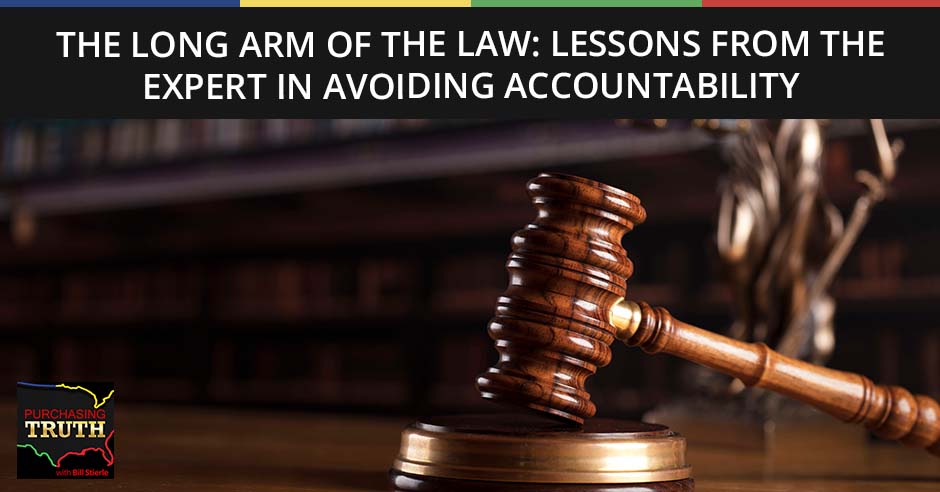The Long Arm of The Law: Lessons from the Expert in Avoiding Accountability
Subscribe Today!

Most of us want to win and get all the things we want. We want to be able to say what we want to say. But what happens when your opinion steps on another person’s beliefs? What happens if you don't look at it as an opportunity to step up and into integrity but as an opportunity to win? Listen in as Bill Stierle and Tom discuss what happens to society when money evades accountability.
---
Watch the episode here
The Long Arm of The Law: Lessons from the Expert in Avoiding Accountability
In this episode, we're going to share with our audience some lessons from the expert in avoiding accountability and being responsible. Our readers may be wondering who that expert is so Bill, help us. Who's the expert we’re learning from?
You're trying to figure out their world and looking to make your way. You want to win and get all the things that you want. You don't want to lose your choice. You want to be able to say what you want to say. Accountability means that you also got to realize that you stepped on somebody else's toe and that there is an ethic, moral or integrity piece that you got to go like, “I went too far on that.”
What happens if you don't look at it as an opportunity to step up into integrity but you look at it as an opportunity to win like, “If I stay at whatever thing I'm saying or doing, I will tire the other side out?” If we take to study experts not doing accountability, they have a line on a scale that I am not going to be accountable or responsible at all or I'm going to take the full responsibility and be a thing like a public servant. I'm going to be a person that works as a volunteer and a person that takes action towards something that I care about. There is a scale.
What does it take to get to the expert and learn lessons on how to not take accountability? The first thing that a person would need to do is create a narrative that they're right and justified for not being accountable like, “I’m not going to do that. Who cares? That person's a loser. I could beat the system. I will figure out how to beat the system.” The biggest challenge has to do with the belief frame that we have. It's called the long arm of the law.
I would have called it a cliché. It’s one of those phrases we probably have heard since our early youth days.
What that phrase means is that you can break the rule once or twice. You can win once or twice at the expense of what is written or agreed upon civilly, morally and criminally but if you get caught and there’s a breadcrumb or a track, it's called a record of you breaking the agreed-upon rules or laws. The long arm of the law is going to get you because it's going to be building evidence that you've done that.
What happens in a society when you can avoid accountability by paying more money and you've got plenty of it to pay so you might as well take it in a wheelbarrow and wheel it all over to the other person and then go back to doing what you want to do and not be accountable or responsible at all? That is one of the situations and circumstances that we're in.
Accountability is not high on the radar list because the long arm of the law means that the law is running the marathon where the marketer is running the sprint. I'm interested in creating a new message to distract from the old message that I gave that distract from the next message and then I can call that, “I've changed my mind,” and/or, “I didn't say that. That's not what I meant there. You didn't hear me fully right back then.” The lesson and the expertise in avoiding accountability are that I get to treat language as an illusion, not as an instrument of accountability.
For a language and communications show, that's a big quote right there.
I treat it as an illusion. I'm using language in smoke and mirrors. This is not like Democrats don't have their version of it or Republicans aren't pressing the edge of the version of that. They’re like, “There is nothing to look at here. This is political.” It's not. When you use language to get people to motivate to do something, they do something terrible and then say, “We did mean that because we have a belief that's not validated in truth and we're going to keep saying that.”
The weird thing about the long arm of the law is that is the arm something that has muscle and is strong or is it a weakling arm? It doesn't have a lot of muscle and it's not very strong. That is something also to think about because what's happening is you can rewrite the laws to be weak so the long arm of the law can’t help you. Welcome to the fight for civil rights or voting rights. The laws are being written so that they are weaker and can't be applied.
Weaker is one way to look at it or the laws can be written in such a way to appear like they're providing safety and protection for something when there's an ulterior motive or purpose.
It’s the language of illusion. I'm saving an illusion that mail-in drop boxes lead to fraud. I said a sentence because somebody could take a lot of ballots, dump them into the box personally and somebody can open that box and ignore that there are illegal ballots in the box as if that is happening. I don't think so because there's an accountability piece there or there’s supposed to be, at least. If there wasn't an accountability piece, I would be the first person to say, “Who did not count that box correct? What volunteer or what person did that thing?”

You can also be like, “Who didn't verify that each vote came in from a registered voter or was matched up with a signature?” There are many different checks and balances there. This is very interesting because we often, on this show, talk about how language can be or maybe should be used to reveal the truth and then we're talking about how language is almost weaponized to avoid accountability, integrity and having to take responsibility for your actions.
The sentence called, “Many people say it's true,” is not a sentence of evidence. It's a sentence of belief, bias or confirmation that something is wrong here because it's not the way I would like to believe it to be true. Did you see how I had to corkscrew my mouth around that? I couldn't even barely get around it. It was hard to do. Somebody doesn't believe the way I believe and I'm listening to my leader who doesn't believe the way I believe.
He said, “Look at Pennsylvania where I was the head and all of a sudden, by midnight, I was behind. There has to be voter fraud,” instead of the places that needed to be counted had a higher volume than the places that had low volume and they were counted first. They have more efficiency because they have more volunteers, more people counting in those rural areas and the vote was going in one direction, whereas in these cities, not much so. They don't have as many people counting the votes because the number of votes comes in in such an accelerated fashion all at once so removing the boxes is not the issue.
I’ve been trying to be humorous at the outset of this episode. The expert that we can learn from in avoiding accountability and being responsible is former President Donald Trump or at least one of the experts we can learn from.
I could've jumped into that answer early but I resisted the bait because the foundation of avoiding accountability and the person that you can learn best about avoiding accountability is a 6 to 15-year-old. Those little human beings do the same thing.
My seven-year-old does it all the time. I’m like, “Why is this cereal bowl left here in the living room and not in the kitchen sink?” He’s like, “I didn't do it.” It’s an immediate reaction. I’m like, “Nobody asked if you did it. Why is it here?”
The 7-year-old, 12-year-old, 15-year-old, 17-year-old, 21-year-old or 25-year-old has got to do a bit of lying to prop up their world and decision-making or lack of it. They got to prop up their actions to protect themselves. They’re not going to admit to it. This is why you don't lock up your seven-year-old or punish them as often as you could. This is why you don't give them a seven-year sentence for leaving a bowl in the living room but aren't you teaching them non-accountability for their actions and also reinforcing their strategy of becoming a very defensive person that does what they want, tries to sneak around, do it and not take accountability? Aren't you fostering that? What kind of parent are you?
Parenting is a challenge. We make our best efforts but seriously, some events are big news or earth-shattering. The Supreme Court decided that they are not going to stop the national archives from releasing the records that the January 6th Committee has been seeking from The White House and it was overwhelming. I read it was about an 8 to 1 with only Clarence Thomas dissenting.
First of all, it legitimizes the January 6th Committee and what they're trying to do. It legitimizes the subpoena power of the House of Representatives that it does have teeth that you may not want there to be accountability for whatever you said, the phone calls you had or whatever documents were created but there will be accountability. It's not political because Donald Trump's Supreme Court that the three justices he put on there did not vote his way on this.
It's a great truth that's no help. He has already planted the crop and the seeds on the field and has tested the name rhino. He has done that already so he has already got Republicans in name only going as a counter-marketing narrative to people who are Republicans that don't agree with him. He has already got that ground laid. His next thing is going to go after the Supreme Court and say to them, “You are rhinos.” He's going to turn on all the people that voted that are there because he needs somewhere between 3 to 5 messages that are directed in the general area of the Supreme Court so that his followers stay with him. It's about weakening the long arm of the law.
He's an expert in all the messaging around it. He's done it his whole life to avoid accountability and responsibility and he's continuing that.
The damage is honesty or truth through exaggeration. You and I exaggerate in the past to make the story that we're telling ourselves true in small, medium and large ways like, “This is the right answer,” but it’s not. Go ask somebody that knows the answer because we're trying to get through our day and make adjustments. It’s the same thing with taxes or any other self-reporting mechanism that takes integrity, honesty and straightforwardness to doing your taxes on your own and then get your tax person to do this.

A lot of times, the tax person does not ask the question and does not become an advocate for you because if they give a piece of advice, they might be stepping over the line. For their integrity, you cannot tell them you did XYZ or you're doing it this way because it's out of the alignment of the tax code and then they're accountable for the long arm of the law. Did you see how that one works? When it came down to Donald Trump exaggerating and doubling the size of the penthouse, you and I could say, “It is right there on the tax return.” It is an exaggeration, a doubling or it crossed the line towards defrauding the state of tax money.
Also, defrauding the banking system for a loan that you got based on the value of that property. Not to be picky, this is the blue side of me but he tripled the size of the penthouse on the forms so you took a 3,000 square foot apartment and made it 10,000 square feet. That's a felony when you lie on loan applications. I don't know what it is for the tax code. It's probably a felony also if it’s proven you're convicted.
All of a sudden, it's like, “I’m sorry. It was a clerical error. I don't know who did that. Allen Weisselberg did it.” Accountability has a strong relationship to blame and shame. I don't know if you have noticed but he blames and shames a lot of people.
It's always somebody else's fault. Everybody who works for him is the best person or people until they're not or until they're no longer in alignment with him. “It's entirely their fault. They're a loser and low class. They were never any good.”
The lessons from the expert are to use blaming and shaming language, criticism and defensiveness. When you use defensiveness, sprinkle in all ranges of denial in it. Keep going after the denial and then shift the accountability to, “Many people are saying this is true and they have the evidence. My taxes are being audited. I can't turn in my tax returns for the election.” For 4 or 5 years, we’ve heard that. Who's doing the audit?
In the ultimate irony, I'm calling it that and we'll see if that sticks here but former President Donald Trump, four years of being President, avoided accountability for his actions on several lawsuits because he was President. The Justice Department said, “The president can't be sued for anything civilly. If it's anything criminal, it has to be done through Congress and impeachment because it's a distraction to him doing his job. You have to wait to sue him until after his presidency.”
He's the former President and is being sued civilly. The Attorney General of New York has come out and said, “We have evidence. He and two of his adult children fudge the numbers here to meet their purposes both ways, to increase the value of their real estate holdings, get more loans and decrease the value to avoid taxes. They were playing it both ways.” The issue of executive privilege, the Supreme Court has said, “Sorry, the National Archives can’t release the documents.”
The day that both of those decisions came down or those things made news, the same day in the ultimate irony of avoiding accountability, not taking responsibility or facing the music if you will, that's what my dad would say is he announced that he is running for president in 2024 so that he can, again, label all this as a political witch hunt and hoping he will be able to drag out the legal process enough that when he's president again, that will stay as illegal actions against him. You were talking about weakening the long arm of the law. Isn't that the ultimate weakening of the long arm of the law?
Yes. You're going to use the system against the system to avoid responsibility and accountability. Integrity is about winning the game using the rules that are in place and then changing the rules to continue to win the game. That is what is not front and center. What's front and center is, “Look at this terrible person doing these things.” Why don't we strengthen the arm of the law so that it meets our ethics and values as a country and then we're able to rebrand ourselves to go, “We came across this guy and this guy took advantage of this system?” Nobody challenged this system until this guy took advantage of the system. We need to not weaken the things to make it easier for the guy or the next guy to gain the system but we want to strengthen the long arm of the law so that if you want to get into this, you're doing time. It’s not going to be three years. It's going to be eighteen months and you're going to show up.
We're going to shorten the accountability. We're not going to allow a lawyer to drag it out to raise their fees to XYZ. The judges need to say, “Counselor, you're going to lose. I'm going to write against you if you try to drag this out. This is not a drag-out jotty. This is, “Bring your evidence. You've got this amount of time to do it. If you don't have it then I am favoring that I am going to write the thing on the other side.” Propaganda creates a lot of damage here and Donald Trump knows this. He says, “Say that we're recounting the votes and that there are irregularities.”
The big part of this show is what do you say to this to stop it? How do you stop this? Let's see if we can get our brain back on how do you listen to the message of somebody avoiding accountability and then change your message so they create accountability. Give them an out so they can still hold onto their self-worth and respect but still be accountable.

Let's use your daughter as an example. I'm going to do Bill Stierle Parenting 101. Step one, when you are noticing a mistake, change the judgmental language into observational language. Instead of, “Who left the bowl in the living room,” you say, “When I see the bowl on the table,” then shift it to a request to meet a need, “Would you be willing to carry that bowl to the sink at this time?” What happens is the person is a little stuck because you're not saying they did something wrong. You're telling a present moment action like, “You left it there. Human beings leave things there all the time.” Your old accountability was to bring it thereafter. Your new accountability is to bring it there now.
By asking if they'd be willing to do that now, it puts them in the place of thinking about, “Am I willing to do it or am I not willing to do that? Do I want to be that person that's not willing to do it?” They get a chance to think about what type of person do they want to be. They can say, “It may be better off for me with dad and mom if I comply and be willing to move the bowl now.” It probably does more to reframe their thinking about responsibility than trying to immediately hold them accountable and point out something that they perhaps didn't do properly before.
The person, as we’ve experienced nationally too is going to want to deny. They’re going to want to justify, blame or assign the mistake to somebody else when you know that no one else is there. You’re the only one that left the bowl there. You're sitting with the truth. This is where the long arm of the law has some problems where we need to create a relationship with integrity, which might sound like this. If they say, “I didn't do it,” that means that they're still trying to protect themselves from something they didn't need to protect themselves from. They're trying to get away from a punishment that's not coming. Say, “I hear that you didn't have your bowl,” even though they're lying to us, “Would you be willing to support me by bringing the bowl? It’s helpful for the family. It helps to keep our place clean so you bring the bowl.”
All of a sudden, they're doing it for you. They're not doing it because they're getting punished. They're doing it from a place of internal motivation. With the condition that's out there whether it's Republicans that believe one thing or Democrats that believe the other thing, there still is an amount of empathy and accountability that's needed for certain things that people say or do. Holding the person accountable is voting the person out of office but if you do a good job of tribalizing and make the other side a worse demon then the voter has to vote for the person that doesn't have integrity because the other person is evil. They’re like, “My person lies but that person's evil.”
They're doing whatever they can to fight the evil people. That’s what's turning out. We're in a very precarious place of unwinding ourselves from, “I've met a Republican and a Democrat. When I'm meeting with them, they might have some beliefs that I don't agree about but I can make it safe to talk about beliefs that I don't agree about and explore the good reasons why they voted in the way they did because they can't vote in the other way. They're weighing certain issues. I want this person because this person stands for a single-issue vote person.” That’s what’s happening to us. We’re singling issue votes.
If I want more Democrats to put out on the ballot, I'm going to put legalized marijuana. I get more voters out because I put that on the ballot and then they happen to check the boxes about these people that don't know anything about. They have no idea who they're voting for. They're voting for that issue. All I got to do is pollute or populate the ballots with issues that they are interested in getting done. I'll put anti-abortion laws, not to get the abortion thing going but to bring out my voter. That's the person that's most likely to do that.
Notice that integrity, accountability and responsibility are not about having a healthy dialogue about the government taking choice away from its citizens, which is what an anti-abortion law does. They would say it is taking the choice away from the unborn child but what about their choice? The healthy dialogue is to say, “Do you lean towards the choice of the mother or the choice of the child?” She gave up her choice. "I don't think that's fully true. Other elements are going into that choice.

To re-establish and get people to be more empathetic and compassionate is to understand that we can be mad at the way our language has put us into this spot but there's also creating a healthy dialogue around accountability, responsibility, integrity, what does fairness look like in the law and how does fairness work with a person that has a lot of money. Fairness might not look that way. If a company pollutes something and it costs $250 million to clean it up but the fine is $10 million then the government has to foot the rest of it back and the company gets to take the profit. That's not fair. They made a choice that caused a consequence.
Accountability, long arm of the law or the short arm of the law. The law can't reach it because you keep weakening the law. That's the condition that we're in. The next thing we could take a look at the next time we get together might be a way to how to have integrity at the relationship between the different issues that we have like the environment, the political system, the criminal system and the civil system. It opens up so much integrity around those various systems. There's work to be done there.
I'd love to talk more about integrity. The other thing we can talk about there is I'm not so sure that Americans, in general, care too much about integrity. I don't see people being upset about it. It'll be very interesting to talk about it.
The need for integrity needs reset. There's got to be something when somebody says something that they're held accountable for. It's hard because we justify our means all the time. We fly spy planes over other countries. Does that meet their need for privacy? No.
I'm sure we always deny that we're doing it, which is not meeting a need for integrity. This will be an interesting ethics and civics discussion in a lot of ways.
Thanks, Tom.
Thanks, Bill.
Take care.




